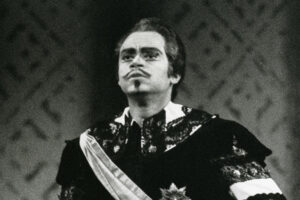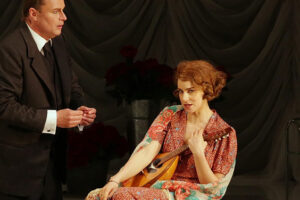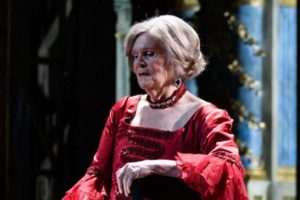

The opera is set in Washington, D. C. in 1953 and 1957, during and after the McCarthy era, particularly focusing on the “lavender scare,” when President Eisenhower’s Executive Order 10450 declared that homosexuals were banned from working in the U. S. government, and over 5,000 lost their livelihoods. Pierce’s libretto wisely keeps the politics ever-present, but in the background; he emphasizes the immediate and personal.
We first meet young intern reporter Timothy Laughlin (Jonas Hacker) sitting on a park bench examining his notes when he strikes up a conversation with Hawkins Fuller, a State Department worker (Joseph Lattanzi). This first scene is brilliantly vague, the two men obviously attracted to one another but only able to drop subtle “cues” while maintaining an objective political conversation.
As the relationship develops amid the paranoid atmosphere in the government offices (Hawk has gotten Timothy a job as a speechwriter to Senator Potter), the two men are discovered in intimate conversation by one of Hawk’s secretaries Miss Lightfoot (Vanessa Becerra), who gives his name to the infamous M304 interrogation unit, where Hawk is asked humiliating questions and forced to take a lie detector test regarding his sexuality.
Though Hawk passes with flying colors, this scene sets in motion the downward spiral of shame, guilt, and fear that dooms the relationship.
Director Kevin Newbury is at the absolute top of his game here. He keeps the action taut and tense through the entire series of brief scenes. The audience found itself holding its collective breath frequently, and Newbury gave us very little time to exhale.
The scene changes (in which the entire ensemble participates) involve moving units on wheels (designed by Vita Tzykun) to create some fifteen different locations, operating with speed and efficiency, never distracting from the action. Newbury makes sure that the politically charged atmosphere of danger and fear is always looming.
Lyric Unlimited has gathered a remarkable ensemble of youthful singing actors, some of which play multiple small roles. Of particular note is the tremendously moving performance of Hacker as the young reporter Timothy, bursting with enthusiasm and excitement in his new life in Washington his new relationship, in which he falls completely in love.
Hacker’s naiveté, innocence, and vulnerability are beautifully on display here, and he produces not a single false note in this entire performance. He sings with fine lyricism and power throughout, and makes a wonderful drama in his first act arioso “Last night! I died last night”, where Timothy battles between his Catholic faith and his new-found sexual impulses. This is a young singer whose career, I predict, is going to soar. He had the audience in the palm of his hand.
Also splendid is Joseph Lattanzi as Hawk, who originated the role in Cincinnati. He is strikingly handsome and his rich baritone is capable of deeply expressive vocalism. He somehow manages to make Hawk likeable throughout, even when his desperation leads him to a despicable act near the end of the opera. He and Hacker have palpable chemistry, their slow-developing relationship consistently believable.
Excellent, too, is Devon Guthrie in the role of Mary, Hawk’s sympathetic office worker who befriends the couple and tries to warn Timothy of Hawk’s straying eye. Ms. Guthrie makes a three-dimensional woman, morally outraged by the homosexual witch hunt and fiercely protective of her friends who are in danger.
The entire ensemble is strong, not a weak link in the chain. Becerra, Will Liverman, Marcus deLoach, Reginald Smith Jr., Amy Kuckelman, and Sam Handley provide vivid characterizations and keep the story moving forward.
Spears’ music suits the emotional landscape of the libretto perfectly. He combines a minimalist style on the surface while writing under layers that express the inner emotions of the scenes. I thought I heard hints of Handel, Verdi, and even Wagner in the more florid sections, all played by a 16-piece small orchestra conducted with flair and panache by Daniela Candillari.
Pierce’s elegant libretto is always believably conversational and has wit, charm, and verbal rhythms that make Spears’ music work even better. One could quibble with a few things in the second act—the characters of Senator Joe McCarthy and Hawk’s new wife Lucy seem to be underdeveloped—but this does no harm to the forward propulsion of the story.
This was personal for me. I was brought back to my own first, tentative, ever-so-slow coming out in the early ‘70’s, when there was still a sense of real danger about who knew and who didn’t. I realized how fortunate the current generation of young gay men and women is to have this kind of relationship on the opera stage.
I was in my mid-thirties before I ever saw sympathetic gay characters as the AIDS plays As Is and The Normal Heart finally appeared. Fellow Travelers is a moving tribute to the generations that came before who had to hide who they were in order to match up to society’s rigorous morality and religious condemnation. It is an important history to remember in the era of Trump and the rise of the religious right.
Photo: Todd Rosenberg
























Comments